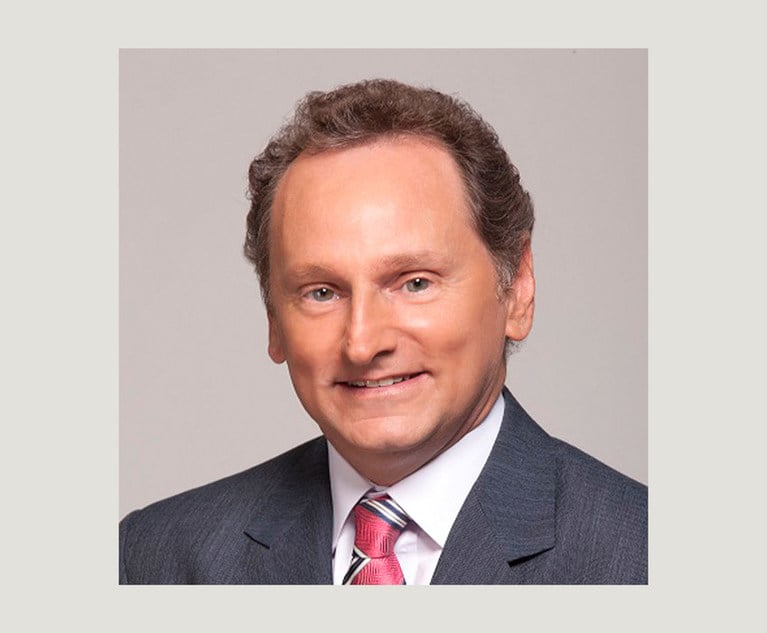Constantly On Call: The Client's Role in the Legal Profession's Mental Health Crisis
Lawyers said many in-house counsel aren't thinking about their impact on the mental health of outside counsel—but they should be.
July 14, 2019 at 07:00 PM
3 minute read

 As firms grapple with high rates of attorney addiction, depression and suicide, many lawyers say in-house departments aren't yet examining their own crucial role in improving the profession's mental health culture.
As firms grapple with high rates of attorney addiction, depression and suicide, many lawyers say in-house departments aren't yet examining their own crucial role in improving the profession's mental health culture.
Client demands for fast turnaround times, even on non-urgent matters, can leave outside counsel in constant crisis mode. That stress can lead to frayed relationships and mental health issues such as depression, addiction and anxiety, which firm lawyers are more likely to experience than corporate in-house counsel.
"We're on this crisis level all the time because of the expectations coming from the clients," said Dan Lukasik, the founder of Lawyers With Depression. He said "a change in the relationship" between firms and in-house clients is needed to improve law's mental health culture.
Many lawyers said legal department leaders often don't think about the impact they're having on outside counsel's mental health, or they don't care—clients pay a high rate for quick responses on all matters.
That mindset lacks both empathy and business acumen, said Jim Patton, the former president of the Association of Corporate Counsel's Kentucky and South Florida chapters. Legal departments invest time and resources into building trust and business knowledge with outside counsel partners.
"It's absolutely tanking your own investment if you don't find that healthy balance," Patton said.
Bree Buchanan, the co-chair of the National Task Force on Lawyer Wellbeing and chair of the American Bar Association's Commission on Lawyers Assistance Programs, noted in-house departments that "run their counsel into the ground are not going to get the quality of work they want."
That's partially why Domenic Cervoni, a vice president in the legal department at HSBC North America, said he's open with firms about what is and isn't urgent. He tries to avoid sending work dumps on a weekend. In his experience, firms do the best work for clients who treat them well.
Spectrum Professional Services corporate counsel Angela Han, also a legal wellness coach, takes a similar approach to outside counsel management. When outside counsel is struggling, Han said that "more than anything, what is appreciated is transparency."
But Cervoni and Han are the exception. Patton said many chief legal officers are still "just starting to say, 'We need to solve this.'" General counsel coming to that realization should let their firms know, he added. They could "help save lives, literally," he said.
Patrick Krill, the founder of legal industry mental health consulting firm Krill Strategies, suggested general counsel set clear expectations around responsiveness for emergencies and non-urgent matters. If the situation is not a crisis, he asks, "Can they wait?"
Clients can also show they're serious about mental health by taking firm wellness programs and practices into account when selecting outside counsel, Buchanan and Patton said. They pointed to the changes sparked by general counsel's push for more diversity: Firms will try to give clients what they want.
"We have to change the entire ecosystem and the entire culture and that does involve all stakeholders coming to the table and saying, 'What can we do to do our part?'" Krill said. "Part of that is in-house counsel, and I think they need to be brought into this conversation."
Read more: Minds Over Matters: An Examination of Mental Health in the Legal Profession
This content has been archived. It is available through our partners, LexisNexis® and Bloomberg Law.
To view this content, please continue to their sites.
Not a Lexis Subscriber?
Subscribe Now
Not a Bloomberg Law Subscriber?
Subscribe Now
NOT FOR REPRINT
© 2025 ALM Global, LLC, All Rights Reserved. Request academic re-use from www.copyright.com. All other uses, submit a request to [email protected]. For more information visit Asset & Logo Licensing.
You Might Like
View All
Ad Agency Legal Chief Scores $12M Golden Parachute in $13B Sale to Rival
3 minute read
Amex Latest Target as Regulators Scrutinize Whether Credit Card Issuers Deliver on Rewards Promises

Sonos' Legal Chief Sees Pay More Than Quadruple Amid Executive Upheaval
3 minute read
Private Equity-Backed Medical Imaging Chain Hires CLO, Continuing C-Suite Makeover
Trending Stories
- 1Departing Attorneys Sue Their Former Law Firm
- 2Pa. High Court: Concrete Proof Not Needed to Weigh Grounds for Preliminary Injunction Order
- 3'Something Else Is Coming': DOGE Established, but With Limited Scope
- 4Polsinelli Picks Up Corporate Health Care Partner From Greenberg Traurig in LA
- 5Kirkland Lands in Phila., but Rate Pressure May Limit the High-Flying Firm's Growth Prospects
Who Got The Work
J. Brugh Lower of Gibbons has entered an appearance for industrial equipment supplier Devco Corporation in a pending trademark infringement lawsuit. The suit, accusing the defendant of selling knock-off Graco products, was filed Dec. 18 in New Jersey District Court by Rivkin Radler on behalf of Graco Inc. and Graco Minnesota. The case, assigned to U.S. District Judge Zahid N. Quraishi, is 3:24-cv-11294, Graco Inc. et al v. Devco Corporation.
Who Got The Work
Rebecca Maller-Stein and Kent A. Yalowitz of Arnold & Porter Kaye Scholer have entered their appearances for Hanaco Venture Capital and its executives, Lior Prosor and David Frankel, in a pending securities lawsuit. The action, filed on Dec. 24 in New York Southern District Court by Zell, Aron & Co. on behalf of Goldeneye Advisors, accuses the defendants of negligently and fraudulently managing the plaintiff's $1 million investment. The case, assigned to U.S. District Judge Vernon S. Broderick, is 1:24-cv-09918, Goldeneye Advisors, LLC v. Hanaco Venture Capital, Ltd. et al.
Who Got The Work
Attorneys from A&O Shearman has stepped in as defense counsel for Toronto-Dominion Bank and other defendants in a pending securities class action. The suit, filed Dec. 11 in New York Southern District Court by Bleichmar Fonti & Auld, accuses the defendants of concealing the bank's 'pervasive' deficiencies in regards to its compliance with the Bank Secrecy Act and the quality of its anti-money laundering controls. The case, assigned to U.S. District Judge Arun Subramanian, is 1:24-cv-09445, Gonzalez v. The Toronto-Dominion Bank et al.
Who Got The Work
Crown Castle International, a Pennsylvania company providing shared communications infrastructure, has turned to Luke D. Wolf of Gordon Rees Scully Mansukhani to fend off a pending breach-of-contract lawsuit. The court action, filed Nov. 25 in Michigan Eastern District Court by Hooper Hathaway PC on behalf of The Town Residences LLC, accuses Crown Castle of failing to transfer approximately $30,000 in utility payments from T-Mobile in breach of a roof-top lease and assignment agreement. The case, assigned to U.S. District Judge Susan K. Declercq, is 2:24-cv-13131, The Town Residences LLC v. T-Mobile US, Inc. et al.
Who Got The Work
Wilfred P. Coronato and Daniel M. Schwartz of McCarter & English have stepped in as defense counsel to Electrolux Home Products Inc. in a pending product liability lawsuit. The court action, filed Nov. 26 in New York Eastern District Court by Poulos Lopiccolo PC and Nagel Rice LLP on behalf of David Stern, alleges that the defendant's refrigerators’ drawers and shelving repeatedly break and fall apart within months after purchase. The case, assigned to U.S. District Judge Joan M. Azrack, is 2:24-cv-08204, Stern v. Electrolux Home Products, Inc.
Featured Firms
Law Offices of Gary Martin Hays & Associates, P.C.
(470) 294-1674
Law Offices of Mark E. Salomone
(857) 444-6468
Smith & Hassler
(713) 739-1250






